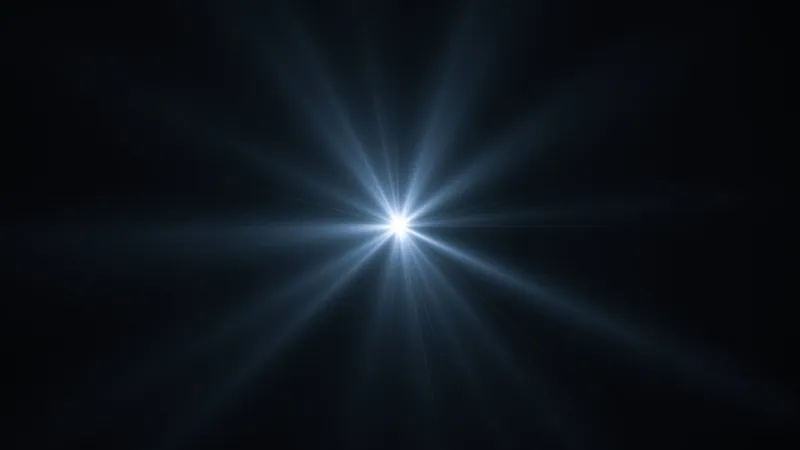
Five Terrifying Theories on How the Universe Could Meet Its End
2025-01-14
Author: Ling
If you've ever lain awake wondering about the ultimate fate of existence, you're not alone. Prepare yourself as we dive into five chilling scenarios that suggest how 'everything' could one day become 'nothing.' Brace yourself for existential dread!
1. The Heat Death of the Universe
Kicking off with perhaps the most widely accepted outcome, the heat death posits a future where the universe cools down to absolute zero. This theory hinges on the ongoing expansion of the universe, a phenomenon discovered in the late 1990s when astronomers noted the surprising acceleration of that expansion, attributed to an enigmatic force known as dark energy. Despite two decades of research, the essence of dark energy remains unknown, leaving scientists baffled.
As dark energy continues its relentless drive, galaxies will drift away from each other at alarming rates. In approximately 10¹⁰⁰ years, the universe will consist of only a thin brew of subatomic particles, utterly devoid of structure and organization. With no temperature differences to facilitate energy transfer, the universe will fall into a state of thermodynamic equilibrium—implying a total lack of energy flow and the end of life as we know it.
2. The Big Rip
But what if dark energy is secretly growing stronger? Enter the Big Rip. If the current trend continues and dark energy intensifies, it might lead to a cosmic disaster, tearing apart galaxies, stars, and eventually everything down to the atomic level. This scenario could ignite a catastrophic unraveling within a few billion years—alarming, considering our universe is only about 13.8 billion years old.
During the Big Rip, not only will clusters of matter be obliterated, but even the fabric of spacetime itself will stretch to the point of nonsensical separation. Imagine a universe where distances no longer hold meaning, where even the closest points in space could end up infinitely far apart.
3. The Big Crunch
This theory flips the expansion model on its head, postulating that the universe may someday start contracting due to gravity. As cosmic contents draw closer together, temperatures and pressures will escalate, reverting billions of years of cosmic expansion into a cataclysmic collapse, culminating in conditions that defy understanding. The final moments could yield a gravitational singularity, marking the end of our universe or transitioning to a new cosmic phase.
4. The Phase Transition Apocalypse
Arguably the most mind-boggling scenario: A sudden phase transition could send our current universe into oblivion. Initially, the early universe experienced numerous phase changes that helped shape its structure. However, there's a chance we're in a metastable state—one that could suddenly decay to a completely different quantum configuration without warning. This transition could begin anywhere in the universe, spreading like wildfire at the speed of light, transforming everything—including you—into an entirely new form of existence. One moment you’re enjoying your morning coffee, and the next, poof! You're part of a universe incompatible with your very being.
5. The Endless Cycle: Conformal Cyclic Cosmology
In stark contrast to these grim endings, renowned physicist Roger Penrose has proposed a more optimistic view through his concept of Conformal Cyclic Cosmology (CCC). This tantalizing idea suggests that after the universe cools and seemingly reaches a heat death, it could enter a new phase where all matter decays into photons, leading to a smoother and more expansive state known as a "blank slate" universe. In this cyclical model, one universe's end is another's beginning, perhaps sparking a new Big Bang filled with fresh possibilities.
In conclusion, the future of our cosmos remains shrouded in mystery, teetering on the edge of chaos. While some prospects pour cold water on our hopes for the future, others hint at the infinite potential of cosmic rebirth. As we ponder these unsettling scenarios, one thing is certain—our universe has a flair for the dramatic!


 Brasil (PT)
Brasil (PT)
 Canada (EN)
Canada (EN)
 Chile (ES)
Chile (ES)
 Česko (CS)
Česko (CS)
 대한민국 (KO)
대한민국 (KO)
 España (ES)
España (ES)
 France (FR)
France (FR)
 Hong Kong (EN)
Hong Kong (EN)
 Italia (IT)
Italia (IT)
 日本 (JA)
日本 (JA)
 Magyarország (HU)
Magyarország (HU)
 Norge (NO)
Norge (NO)
 Polska (PL)
Polska (PL)
 Schweiz (DE)
Schweiz (DE)
 Singapore (EN)
Singapore (EN)
 Sverige (SV)
Sverige (SV)
 Suomi (FI)
Suomi (FI)
 Türkiye (TR)
Türkiye (TR)
 الإمارات العربية المتحدة (AR)
الإمارات العربية المتحدة (AR)